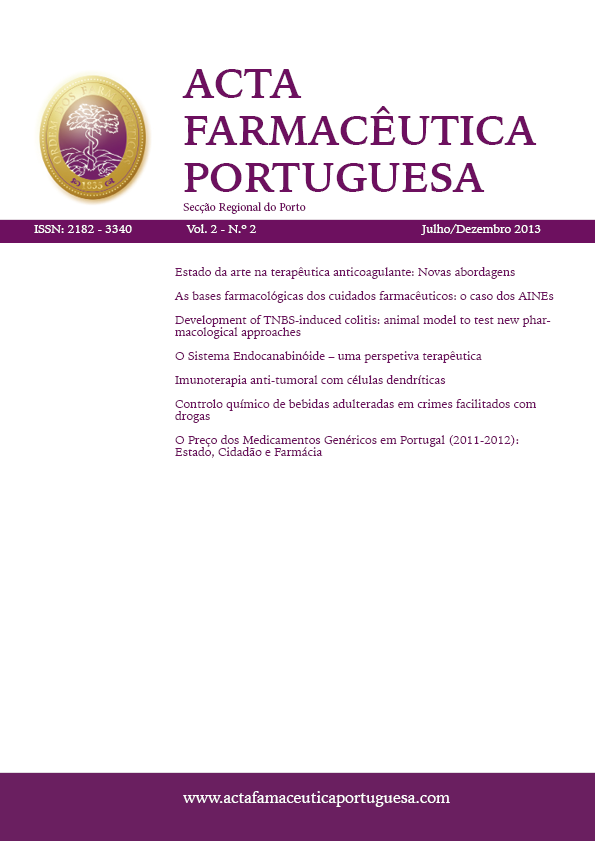Imunoterapia anti-tumoral com células dendríticas
Resumo
As células dendríticas (DCs) são células apresentadoras de antigénio dotadas de uma extraordinária capacidade de estimular e regular a resposta dos linfócitos T. Devido à sua capacidade imunomoduladora e ao reduzido número de DCs ativadas capazes de gerar uma eficiente resposta imunológica, as DCs têm sido muito utilizadas em ensaios clínicos com o intuito de obter ou amplificar uma resposta imune anti-tumoral. Apesar de estudos clínicos evidenciarem que as vacinas de DCs são seguras e induzem uma resposta imunológica na maioria dos doentes, o número de casos com remissões completas do tumor ainda é pequeno. Para aumentar a eficácia clínica é necessário melhorar e criar novas estratégias que incluam a amplificação da imunidade adaptativa anti-tumoral e o bloqueio da proliferação de linfócitos T reguladores e do micro-ambiente imunossupressor. A combinação de vacinas de DCs com os protocolos convencionais de quimio e radioterapia promovem a ativação de DCs, a apresentação cruzada de antigénios e a eliminação seletiva de células imunossupressoras, revertendo o estado de imunossupressão inerente ao tumor. Assim, esta associação de quimioimunoterapia poderá explorar positivamente a capacidade das DCs na obtenção de uma resposta imunológica mais eficaz.
Referências
Goldsby RA, Kindt TJ, Osborne BA. Kuby Im- munology. 6a Ed. New York: W. H. Freeman and Company. p. 38-40, 2007.
flammatory signaling in innate Immune defen-
ses. Clin Microbiol Rev. 2009; 22(2):240-273.
Brussel IV, Berneman ZN, Cools N. Optimizing dendritic cell-based immunotherapy: tackling the complexity of different arms of the immune
system. Mediat Inflamm. 2012; 2012:1-14.
Boudreau JE, et al. Engineering dendritic cells to enhance cancer immunotherapy. Mol Thera-
py. 2011; 19(5):841-853.
Koido S, et al. Current Immunotherapeutic Ap-
proaches in Pancreatic Cancer. Clin Dev Immu-
nol. 2011; 2011:1-15.
Borghaei H, Smith MR, Campbell KS. Immu-
notherapy of cancer. Eur J Pharmacol. 2009;
:41-54.
Sabado RL, Bhardwaj N. Directing dendritic
cell immunotherapy towards successful cancer
treatment. Immunotherapy. 2010; 2(1):37-56. 14. Zhu J, Paul WE. Peripheral CD4+ T-cell diffe- rentiation regulated by networks of cytokines and transcription factors. Immunol Rev. 2010;
(1):247-262.
Amedei A, et al. Novel immunotherapeutic
strategies of gastric cancer treatment. J Biomed
Biotechnol. 2011; 2011:1-17.
Nicolette CA, et al. Dendritic cells for active
immunotherapy: optimizing design and manu- facture in order to develop commercially and clinically viable products. Vaccine. 2007; 25:47-
Neves BMR. Modulação das células dendríticas
por estímulos alergénicos e infeciosos. Tese de Doutoramento em farmácia, na especialidade
de biologia celular e molecular. Faculdade de
Farmácia da Universidade de Coimbra. Coim- 60.
bra: Universidade de Coimbra. p. 1-61, 2010.
Paczesny S, et al. Dendritic cells as vectors for immunotherapy of cancer. Semin Cancer Biolo-
gy. 2003; 13:439-447
Schuler G. Dendritic cells in cancer immuno-
therapy. Eur J Immunol. 2010; 40:2123-2130.
Jähnisch H, et al. Dendritic cell-cased immuno- therapy for prostate cancer. Clin Dev Immunol.
; 2010:1-8.
Kalinski P. Dendritic cells in immunotherapy of
established cancer: roles of signals 1, 2, 3 and 4.
Curr Opin Inv Drugs 2009; 10(6):526-535.
Steinman RM, Banchereau J. Taking dendritic
cell into medicine. Nature. 2007; 449:419-426.
Mogensen TH. Pathogen recognition and in-
Turnis ME, Rooney CM. Enhancement of den- dritic cells as vaccines for cancer. Immunothe- rapy. 2010; 2(6):847-862.
Palucka K, et al. Dendritic cells: are they clini- cally relevant?. Cancer J. 2010; 16(4):318-324.
Apetoh L, et al. Harnessing dendritic cells in cancer. Semin Immunol. 2011; 23:42-49.
Dubsky P, et al. IL-15-induced human DC effi- ciently prime melanoma-specific naive CD8+ T cells to differentiate into CTL. Eur J Immunol. 2007; 37:1678-1690.
Shurin MR, et al. Genetically modified dendritic cells in cancer immunotherapy: a better tomor- row?. Exp Opin Biol Ther. 2010; 10(11):1539- 1553.
Lapteva N, et al. Enhanced activation of hu- man dendritic cells by inducible CD40 and Toll-like receptor-4 ligation. Cancer Res. 2007; 67(21):10528-10537.
Wiethe C, et al. Enhanced effector and memory CTL responses generated by incorporation of receptor activator of NF-kB (RANK)/RANK li- gand costimulatory molecules into dendritic cell immunogens expressing a human tumor – specific antigen. J Immunol. 2003; 171(8):4121- 4130.
Park D, et al. An essential role for Akt1 in den- dritic cell function and tumor immunotherapy. Nat Biotechnol. 2006; 24(12):1581-1590.
Matsushita N, et al. Targeting MARCO can lead to enhanced dendritic cell motility and anti- -melanoma activity. Cancer Immunol Immuno- ther. 2010; 59(6):875-884.
Hong B, et al. Human SOCS1 controls immu- nostimulatory activity of monocyte-derived dendritic cells. Cancer Res. 2009; 69(20):8076- 8084.
Breckpot K, et al. Attenuated expression of A20 markedly increases the efficacy of double-stran- ded RNA-activated dendritic cells as an anti- -cancer vaccine. J Immunol. 2009; 182(2):860- 870.
Palucka K, et al. Dendritic cells and immunity against cancer. J Internal Med. 2010; 269:64-73.
Ramakrishnan R, et al. Chemotherapy enhan- ces tumor cell susceptibility to CTL-mediated killing during cancer immunotherapy in mice. J
Clin Inv. 2010; 120(4):1111-1124.
Wang Z, et al. Pancreatic cancer: understanding
and overcoming chemoresistence. Nat Rev
Gastroenterol Hepatol. 2011; 8(1):27-33.
Kirkwood JM, et al. Immunotherapy of cancer
in 2012. Cancer J Clin. 2012; 62(5):309-335.
Lee WC, et al. Vaccination of advanced hepato- cellular carcinoma patients with tumor lysate- -pulsed dendritic cells: a clinical trial. J Immu-
nother. 2005; 28(5):496-504.
Zerbini A, et al. Radiofrequency thermal abla-
tion of hepatocellular carcinoma liver nodules can active and enhance tumor-specific T-cell
Imunoterapia anti-tumoral com células dendríticas 59 responses. Cancer Res. 2006; 66(2):1139-1146.
Kantoff PW, et al. Sipuleucel-T immunotherapy for castration-resistant prostate cancer. J Med. 2010; 363(5):411-422.
Takahara A, et al. Gemcitabine enhances Wil- ms’ tumor gene WT1 expression and sensiti- zes human pancreatic cancer cells with WT1- -specific T-cell-mediated antitumor immune response. Cancer Immunol Immunother. 2011; 60(9):1289-1297.
Kono K, et al. Dendritic cells pulsed with HER- 2/neu-derived peptides can induce specific T- -cell responses in patients with gastric cancer. Clin Cancer Res. 2002; 8(11):3394-3400.
Czerniecki BJ, et al. Targeting HER-2/neu in ear- ly breast cancer development using dendritic cells with staged interleukin-12 burst secretion. Cancer Res. 2007; 67(4):1842-1852.
Dohnal AM, et al. Phase 1 study of tumor Ag- -loaded IL-12 secreting semi-mature DC for treatment of pediatric cancer. Cytotherapy. 2007; 9(8):755-770.


